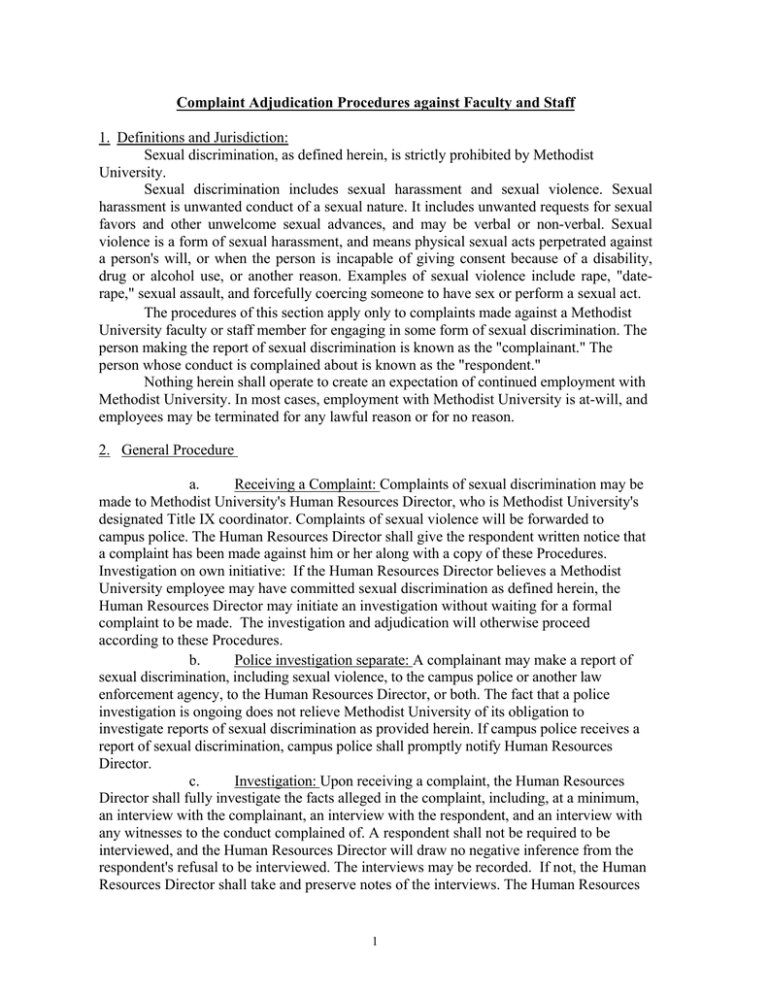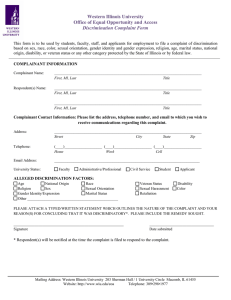
Complaint Adjudication Procedures against Faculty and Staff
1. Definitions and Jurisdiction:
Sexual discrimination, as defined herein, is strictly prohibited by Methodist
University.
Sexual discrimination includes sexual harassment and sexual violence. Sexual
harassment is unwanted conduct of a sexual nature. It includes unwanted requests for sexual
favors and other unwelcome sexual advances, and may be verbal or non-verbal. Sexual
violence is a form of sexual harassment, and means physical sexual acts perpetrated against
a person's will, or when the person is incapable of giving consent because of a disability,
drug or alcohol use, or another reason. Examples of sexual violence include rape, "daterape," sexual assault, and forcefully coercing someone to have sex or perform a sexual act.
The procedures of this section apply only to complaints made against a Methodist
University faculty or staff member for engaging in some form of sexual discrimination. The
person making the report of sexual discrimination is known as the "complainant." The
person whose conduct is complained about is known as the "respondent."
Nothing herein shall operate to create an expectation of continued employment with
Methodist University. In most cases, employment with Methodist University is at-will, and
employees may be terminated for any lawful reason or for no reason.
2. General Procedure
a.
Receiving a Complaint: Complaints of sexual discrimination may be
made to Methodist University's Human Resources Director, who is Methodist University's
designated Title IX coordinator. Complaints of sexual violence will be forwarded to
campus police. The Human Resources Director shall give the respondent written notice that
a complaint has been made against him or her along with a copy of these Procedures.
Investigation on own initiative: If the Human Resources Director believes a Methodist
University employee may have committed sexual discrimination as defined herein, the
Human Resources Director may initiate an investigation without waiting for a formal
complaint to be made. The investigation and adjudication will otherwise proceed
according to these Procedures.
b.
Police investigation separate: A complainant may make a report of
sexual discrimination, including sexual violence, to the campus police or another law
enforcement agency, to the Human Resources Director, or both. The fact that a police
investigation is ongoing does not relieve Methodist University of its obligation to
investigate reports of sexual discrimination as provided herein. If campus police receives a
report of sexual discrimination, campus police shall promptly notify Human Resources
Director.
c.
Investigation: Upon receiving a complaint, the Human Resources
Director shall fully investigate the facts alleged in the complaint, including, at a minimum,
an interview with the complainant, an interview with the respondent, and an interview with
any witnesses to the conduct complained of. A respondent shall not be required to be
interviewed, and the Human Resources Director will draw no negative inference from the
respondent's refusal to be interviewed. The interviews may be recorded. If not, the Human
Resources Director shall take and preserve notes of the interviews. The Human Resources
1
Director will also preserve any relevant documents or other evidence gathered by the
coordinator.
d.
Interim Measures: The University will not automatically restrict a respondent
from coming to work or participating in other University activities on the basis of a
complaint of sexual discrimination. However, Methodist University reserves the right to
impose interim remedial measures at any time upon receiving a report of sexual
discrimination, if the University has concerns about the safety of the Methodist community.
Such measures may include, but are not limited to, restrictions regarding movement on
campus, removal from University housing and/or removal from campus. The decision to
impose interim measures is made by the Human Resources Director, the Vice President for
Business Affairs, or by the University's President. The University will also enforce any
court order.
e.
Retaliation prohibited: Retaliation against anyone who brings forward a
complaint of sexual discrimination is strictly prohibited. Anyone responsible for retaliation
or threats of retaliation, whether that person is the accused party, someone affiliated with the
accused (i.e. a friend or family member), or any other party, will be subject to disciplinary
action by the University. Retaliation should be reported promptly to the Human Resources
Director. Retaliation by a person not affiliated with the University may be addressed by the
police.
3. Adjudication: Upon completion of his or her investigation the Human Resources
Director shall:
a.
If appropriate, facilitate informal mediation between the complainant and
the respondent by the Conflict Management Response Team according to the procedures
outlined in the “Conflict Management Procedures” section of the Methodist University
Staff Handbook, subject to the following conditions:
i.
The complainant may decline to participate in informal mediation, in
which case the matter will be processed as otherwise provided in these Procedures.
ii.
In no case will a complaint of sexual violence be informally
mediated.
b.
If the respondent is a staff member, forward the investigation and materials
to the Vice President for Business Affairs, who shall determine
i. If it is more likely than not that the respondent committed sexual
discrimination as defined herein, and, if so,
ii. An appropriate sanction.
c.
If the respondent is a faculty member, forward the investigation and
materials to the Academic Dean, who shall determine
i. If it is more likely than not that the respondent committed sexual
discrimination as defined herein, and, if so,
ii. An appropriate sanction.
d.
If the respondent is a Vice-President or Dean of the University, to the
President of the University, who shall determine
i. If it is more likely than not that the respondent committed sexual
2
discrimination as defined herein, and, if so,
ii. An appropriate sanction.
4. Sanctions: If the appropriate authority determines that the respondent committed sexual
discrimination as defined herein, the he or she shall order an appropriate sanction, and shall
consider a range of sanctions from no punishment to termination. The Title IX Coordinator
shall promptly inform the complainant and respondent of the determination and of the
sanction imposed, if any.
5. President's Review: The President of the University may, in his or her discretion, review
the determinations of the Vice President for Business Affairs or the Academic Dean. A
respondent who wishes for the President to review those determinations shall notify the
President by writing within 48 hours of being notified of the determination.
If the President reviews the determination, the Human Resources Director shall
inform the complainant and respondent of the final outcome of the case.
3




